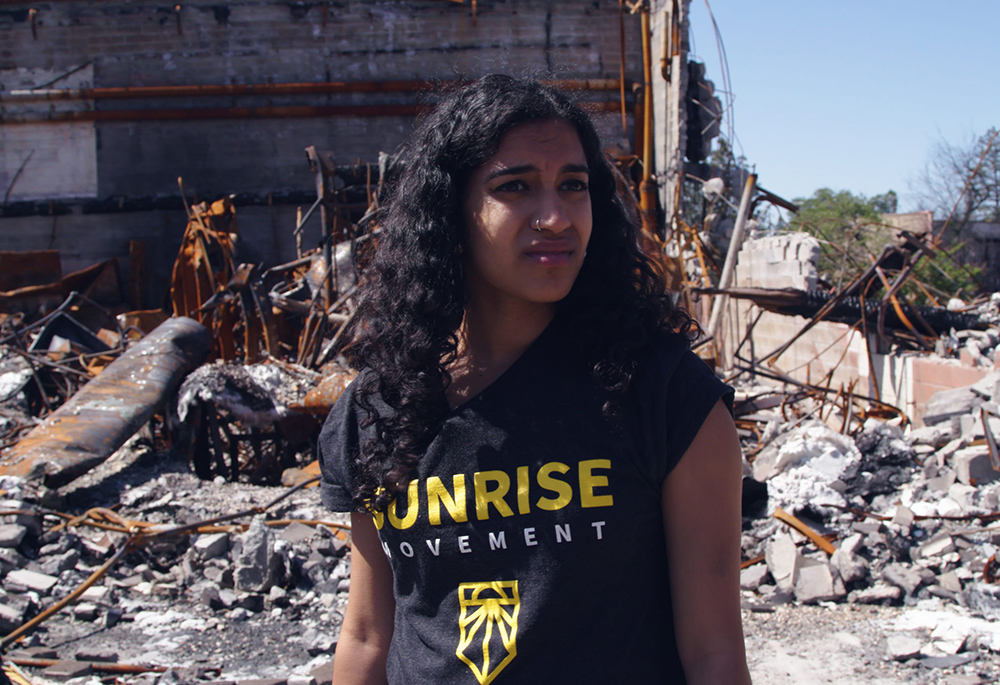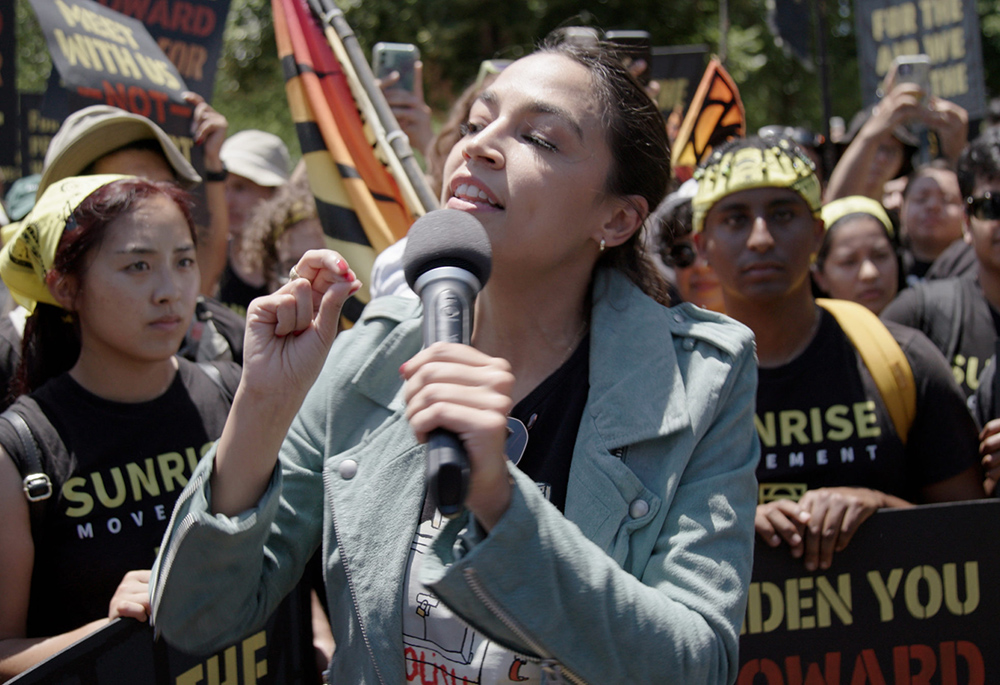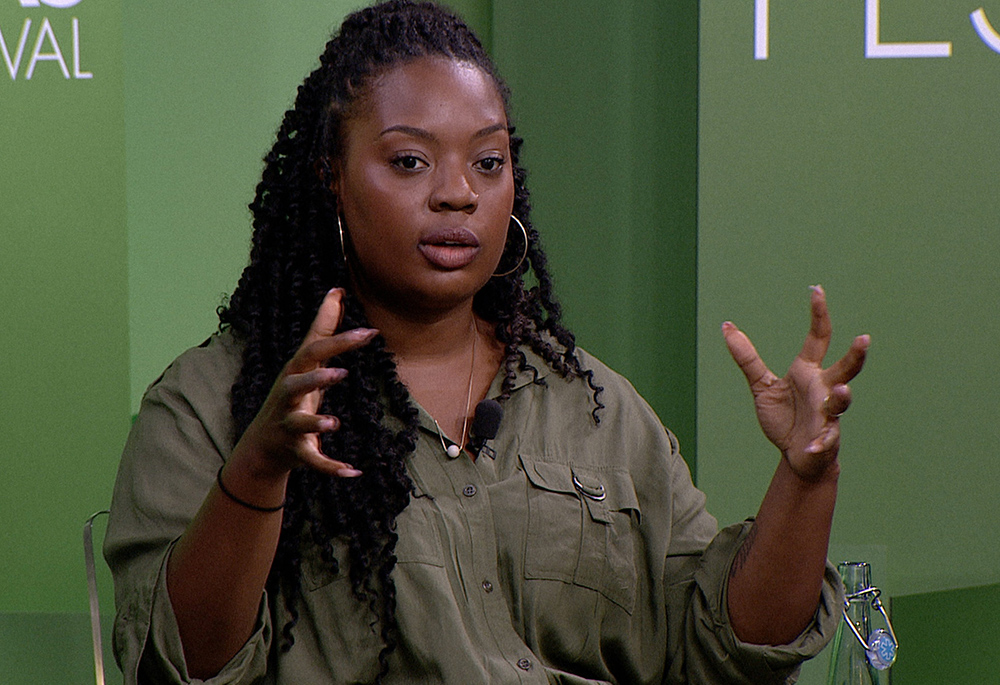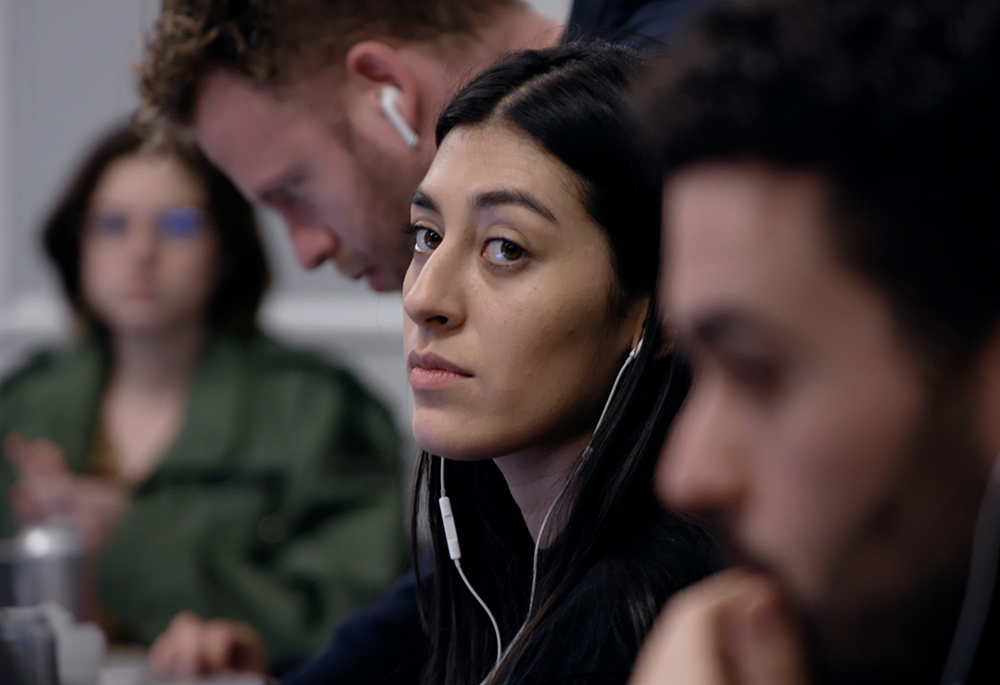
Varshini Prakash, co-founder and executive director of the Sunrise Movement, in "To the End" (Courtesy of Roadside Attractions/Amber Fares)
"To the End," the new documentary from director Rachel Lears, opens in hell, quite literally, as we witness a harrowing scene from the point of view of passengers inside a car trying to find their way out of a massive California wildfire. For as far as the eye can see, it's as if the sky and ground have merged into a wall made out of flames. An inescapable sea of overpowering red and orange, a landscape that might have very well been
At first, the scene feels almost unreal, like something out of a big Hollywood disaster movie, the kind in which a group of heroes have spent the whole time warning indifferent or disbelieving crowds about an impending disaster only to earn their attention when it's far too late. Suddenly, two things become evident: this is no CGI extravaganza, and we know those fires because they have become the norm across the globe during the summers.
In 2022, wildfires consumed about 362,000 acres of California forest, the equivalent of around 724 Disneylands. People in Europe witnessed scenes like passengers trapped inside a train between Zaragoza and Valencia, who had to plead to be let out of their cars as the temperature rose and smoke became unbearable due to a wildfire. "Why would they even let the train travel?" asked an anguished passenger on Spanish television. Capitalism sending us into an inferno in order to satiate its hunger.

Rep. Alexandria Ocasio-Cortez in "To The End" (Courtesy of Roadside Attractions/Rachel Lears)
The second, far more terrifying realization is that the heroes did warn us and continue to do so, but we have chosen not to listen. Although women aren't prominently mentioned in Scripture, compared to men, they play a key role in the spreading of the word. After all, Jesus first appeared to "Mary Magdalene and the other Mary" on the day of his resurrection. "Go quickly, and tell his disciples," they were asked.
In "To the End," we see how it's women who continue being holy messengers, this time in the pursuit of preserving our planet. Lears follows four women of color who seek to raise awareness about climate change through advocacy in government and official institutions. U.S. Rep. Alexandria Ocasio-Cortez, Varshini Prakash, who co-founded the Sunrise Movement, Alexandra Rojas of Justice Democrats, and Rhiana Gunn-Wright, the climate policy director for the Roosevelt Institute, named after the president who once proclaimed "the nation that destroys its soil destroys itself."
A sequel of sorts to "Knock Down the House," the 2019 documentary that followed the political campaigns of four women during the 2018 midterms, ending with the system-shaking election of Ocasio-Cortez, who unseated Democratic Rep. Joe Crowley who had been a member of Congress for two decades. If "Knock Down the House" was Lears' "Rocky," her take on the underdog genre, "To the End" is her version of an eco-thriller. A time bomb of a film that is also defiantly infused with hope.
Advertisement
"We wanted to really show this narrative tension between the apocalyptic imagery of climate disasters themselves … juxtaposed with the utopian imagining that activists and organizers must do to imagine alternative futures," explained Lears during our video call on the film's opening weekend. "It's not a dystopian story, it's a story about four courageous women of color who are encountering these dystopian dimensions of the climate disasters themselves."
In "Knock Down the House," the protagonists' shared goal was specifically to win an election. In "To the End," they share a mission, but the course of action is vastly different for each. There aren't many rousing speeches or emotional cliffhangers, instead, the film unfolds in meetings and offices that are suddenly interrupted by a global pandemic. Lears expertly shows what she calls the "Kafkaesque world of Washington, D.C. politics," where the way out of the maze sometimes takes years of policymaking.
Although the film has post-apocalyptic qualities, unlike Hollywood films where climate change usually puts white middle-class characters in peril, Lears shows us that it's really Black, brown, Indigenous, and poor people who are most affected. It's impossible not to wonder how the marginalized draw the strength to continue fighting for the well-being of everyone. Facing sexism and racism, among other obstacles that seem custom-made for them, the four women in the film continue doing the work that might just save all of us.
But, how? Why? "Faith," Lears said.

Rhiana Gunn-Wright, director of climate policy at the Roosevelt Institute, in "To the End" (Courtesy of Aspen Institute)
Early in the film, Ocasio-Cortez explains that "making change through politics requires faith," the ability to maintain hope during moments when things might not go your way.
Culturally, Lears comes from a Catholic and Protestant background, but she considers herself to be spiritual rather than religious. "For me, faith is just the opposite of cynicism," she said, "it's the opposite of giving up, the belief that another world is possible."
Lears posits that if change is part of our daily life, the possibilities lie in all the changes we can create. For the director, it's a little bit like William James writing, "My first act of free will shall be to believe in free will"; people can debate forever about what can and can't be done, "but we'll never really know unless we try," she said.
"To the End" is in many ways a film about what everyone, regardless of political affiliation or religious views, can admire: how far people can go to defend what they believe in. During one of the most powerful scenes in the film, Ocasio-Cortez declares, "I would not be here without Standing Rock," to a Native American committee visiting her office. Upon arriving at camp, she had been told that everything she did there was ceremony.
"I left that experience willing to just give everything," she exclaims, recalling what feels like a baptism. "This isn't about whether we switch to solar panels. It is first and foremost a spiritual battle."

Alexandra Rojas, executive director of Justice Democrats, in "To the End" (Courtesy of Roadside Attractions/Doug Anderson)
This encapsulates why the film has the sturdy backbone of a spiritual, a hymn that needs to be sung by many more. In addition to her studies in cultural anthropology and media, Lears has a Master of Arts in ethnomusicology — before becoming a full-time filmmaker she devoted much of her creative output to songwriting. She compares the structure of her films to songwriting, where she's choosing a few characters to tell specific stories with universal appeal. "To the End" indeed has the heart of a folk song.
It's not a spoiler to say the film doesn't have a happy ending, its finale, after all, is under construction. But by giving us a peek into the lives of those who muster the courage to go against Goliaths, it doesn't turn towards tragedy either.
"We're going through his transition," said Lears, adding, "the world is not ending. Certain aspects of the world as it has been probably should end in order to make way for what comes next."
"But what we're really doing is trying to build a new world," she said, "and humans have always done that."
First comes the faith needed to challenge obsolete power structures, which is expressed through action, which could potentially inspire others to join the work.
"And collective action is how we're going to build the world to come," said Lears, her voice sounding like an instrument of faith.








